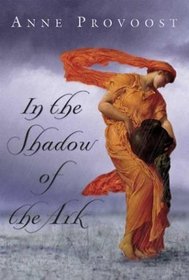An interesting view on the traditional story of the ark. Not exactly what you want if you actually believe the bible and are offended by stretching the truth a bit.
Helpful Score: 2
This is an excellent book about what might have happened at the time of Noahs Ark. Written in the same way as 'The Red Tent'
Helpful Score: 2
ollowing on the commerical success of Anita Diamant's 'The Red Tent,' publishers have struck on Belgian author Anne Provoost's retelling of the story of Noah's Ark as their next great hope...
However, although it does tell a Biblical story from the perspective of a young woman, in many ways the two are not very similar books.
Where 'Red Tent' is in many ways a very historical, 'how it might have been' kind of tale, Provoost is more concerned with the mythic and especially the allegorical elements of the story. The cultures of the tribal peoples she portrays are more symbolic than based in archaeological research.
Through the classic story of Noah, focusing on a young woman, the daughter of a shipbuilder, who becomes Noah's son Ham's concubine, Provoost explores the themes of righteousness and evil, the hubris of claiming to be 'chosen,' and the pettiness of a god that would destroy the innocent in favor of one family of no particular merit or virtuousness... especially since, as Provoost points out, the flood failed to eliminate evil from the world. (But is this due to a failing in the Unnameable's plan? Or is it due to the failings of the chosen family... including allowing non-chosen stowaways on the ark, and secretly making sacrifices to the old gods while on the ark... (they even sacrifice the dove.... how symbolic!))
Interestingly, in the story, the characters (and Provoost? it's hard to tell) do not question the existence of deities - just their motivations and justifications.
An interesting book - but it doesn't really absorb you in the feeling of life in a different time, as some historical fiction does. Also, it's very thought-provoking... but I can't help feeling that some of this is just that the reader has to question "What exactly did the author MEAN by that ?" because it's not always very clear...
However, although it does tell a Biblical story from the perspective of a young woman, in many ways the two are not very similar books.
Where 'Red Tent' is in many ways a very historical, 'how it might have been' kind of tale, Provoost is more concerned with the mythic and especially the allegorical elements of the story. The cultures of the tribal peoples she portrays are more symbolic than based in archaeological research.
Through the classic story of Noah, focusing on a young woman, the daughter of a shipbuilder, who becomes Noah's son Ham's concubine, Provoost explores the themes of righteousness and evil, the hubris of claiming to be 'chosen,' and the pettiness of a god that would destroy the innocent in favor of one family of no particular merit or virtuousness... especially since, as Provoost points out, the flood failed to eliminate evil from the world. (But is this due to a failing in the Unnameable's plan? Or is it due to the failings of the chosen family... including allowing non-chosen stowaways on the ark, and secretly making sacrifices to the old gods while on the ark... (they even sacrifice the dove.... how symbolic!))
Interestingly, in the story, the characters (and Provoost? it's hard to tell) do not question the existence of deities - just their motivations and justifications.
An interesting book - but it doesn't really absorb you in the feeling of life in a different time, as some historical fiction does. Also, it's very thought-provoking... but I can't help feeling that some of this is just that the reader has to question "What exactly did the author MEAN by that ?" because it's not always very clear...
Helpful Score: 2
I'm not sure why this book is listed as "children's." Although it is a light read (I finished it in a day), there are definite adult themes throughout.
Helpful Score: 1
An interesting, fanciful side of the Noah's Ark story as told by an outsider... Not too preachy or religious, just think of it as historical fiction.





